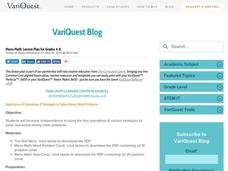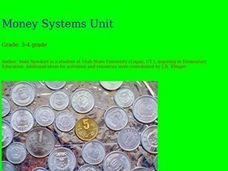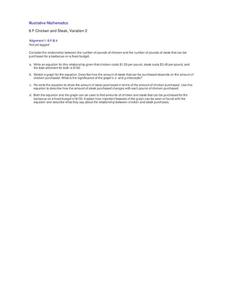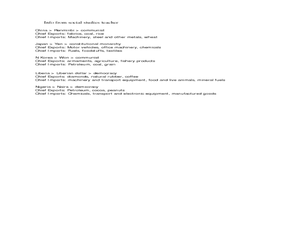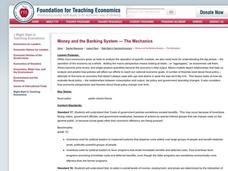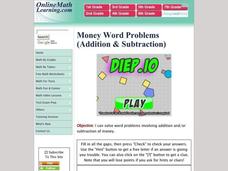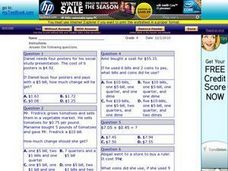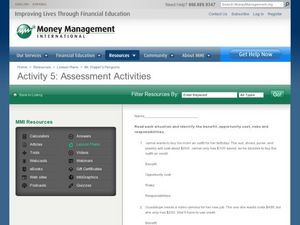Curriculum Corner
Menu Math
Getting a meal, side dish, drink, and dessert can be delicious—but it can be expensive too! Practice addition and subtraction with money in a lesson that focuses on a sample menu, complete with task cards and word problems.
Carstens Studios
Math Doodles
Discover the joy and excitement of improving your math fluency through four different puzzles. Combine those with 25 different ways to represent numbers and you have hours of enjoyment that can be fun outside of the classroom as well.
Curated OER
Reviewing With Games
Change up your review strategies to reduce testing anxiety and appeal to multiple intelligences.
Curated OER
Money Systems
Students examine how paper money and coins have changed over time. They discuss different types of exchanging items for payment. They practice making change.
Curated OER
Operations with Decimals
Help your learners get practice with operations involving decimals. They will follow prescribed steps that require them to use mixed operations to solve problems with decimals. Great for practice after pupils have had comprehensive...
Curated OER
Making Change
In this making change worksheet, students read about how to make change, then determine the correct amount of change for 4 items when paid with a given amount.
Illustrative Mathematics
Chicken and Steak, Variation 2
Many organizations put on barbecues in order to make money. In a real-world math problem, the money allotted to purchase steak and chicken at this barbecue is only one hundred dollars. It is up to your potential chefs to figure out how...
American Statistical Association
Exploring Geometric Probabilities with Buffon’s Coin Problem
Scholars create and perform experiments attempting to answer Buffon's Coin problem. They discover the relationships between geometry and probability, empirical and theoretical probabilities, and area of a circle and square.
Curated OER
Changing the Currency of Different Countries
Seventh graders explore changing currency. In this international math lesson, 7th graders will write and solve 2-step equations in order to convert currencies between nations. Students will research prices of items and currency...
Curated OER
Everyday Mathematics: Counting Up
In this counting up worksheet, students learn strategies to help them solve problems involving change. Students study a number grid and number line to help them count up to make change.
Foundation for Water & Energy Education
How Can Work Be Done with Water Power? Activity C
Third in a set of lessons regarding reservoirs, dams, and hydropower, this involves a two-day hydropower plant simulation. Collaborative groups build, maintain, and finance the plant. The transparency of the reservoir setup can be...
Curated OER
Money and Banking
Learners explore the role of government in the economy market. In this economics instructional activity, students analyze the decision making and how it takes into consideration additional cost, benefits and public awareness of what they...
Curated OER
Common Sense Cookie Shop
First graders shop for a bag of cookies using toy money. In teams, they choose which variety to buy and decides which bills and coins are necessary to buy the bag of cookies and a cashier makes change. They tally the cookies purchased...
Curated OER
Money Word Problems
In this money worksheet, learners complete word problems where they add and subtract money. Students complete 9 word problems total.
Federal Reserve Bank
The Fed Is Protecting Your Money
A dollar bill, a check, a credit card, and... a cow? What exactly are the various forms of payment that exist today? Your learners will identify the three functions of money in this lesson. In addition, they will discover the most...
Curated OER
Double Your Money
What a creative way to delve into adding large numbers! After listening to a story called The King's Chessboard, learners estimate how much money they would have each day following instructions based on doubling and exponentially...
CK-12 Foundation
Domain and Range of a Function: Making Money Math
Graphs are useful for many things, including seeing how much money you can make. Individuals create a graph of earnings from a job based on the number of hours. They determine the domain and range of the graph and answer challenge...
Humanities Texas
Primary Source Worksheet: Thomas Jefferson, Confidential Message to Congress Concerning Western Exploration and Relations with the Indians
A confidential message written by Thomas Jefferson provides readers with an opportunity to practice their reading comprehension skills. The resource, part of a series, includes questions that require a close reading of the message and a...
Curated OER
Counting and Making Change
In this mathematics worksheet, students solve various counting and money problems. They identify the quarter, dime, nickel, and penny, and how much each is worth. Students also add up the totals for various combinations of the currency...
Curated OER
Money Word Problems Test
In this solving story problems with money instructional activity, students find the amount of change and coins needed to solve. Students solve nine problems.
NTTI
Putting Together Ten
Groups explore sets of 10 items in two varieties (i.e. 3 white buttons and 7 black ones, or 5 bears and 5 bunnies). They brainstorm about their objects, write math sentences to represent what they have, and report their discoveries...
Curated OER
Adding and Subtracting Money
Students investigate U.S. currency by pretending to buy food. In this money lesson, students discover the vocabulary and value for each U.S. coin, then add the amounts in dollars and cents of food items they wish to purchase....
Curated OER
History In The Making
Learners visit Colonial America in a Time Machine to discover the process that a citizen today must follow in order to make or change a law. Students research the Colonial Era in their Time Machines. Learners encounter various government...
Curated OER
Money situations
In this money situations learning exercise, students read money word problems and then list the benefit, opportunity cost, risks, and responsibilities for each one. Students do this for 6 questions.


